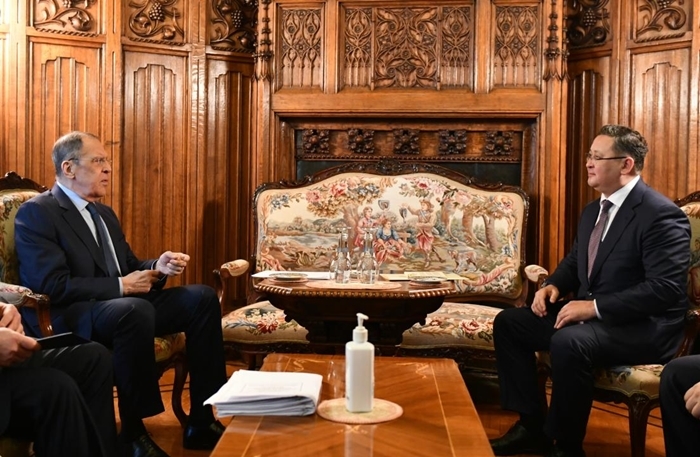Issues of regional interaction were widely discussed during the talks between Kazakhstan’s and Russia’s Foreign Ministers
The new Minister of Foreign Affairs of Kazakhstan Murat Nurtleu, appointed to this post just over a week ago, made his first foreign visit in a new capacity to Moscow.
“This underlines the objective reality – the closest ties between Russia and Kazakhstan. These are relations of strategic partnership and alliance based on historical ties of friendship, multifaceted mutually beneficial cooperation, mutual trust and respect,” Russian Foreign Minister Sergey Lavrov stressed at a press conference following the talks.
Actually, the interaction between Moscow and Astana goes far beyond the bilateral agenda. Russia is actively promoting the concept of a broad Eurasian partnership, which is especially relevant now in the multipolar world taking shapes. Clearly, the involvement of Kazakhstan, as one of the leading economies of Central Asia, a heartland of Eurasia, in the implementation of the ideas of Eurasian integration is of key importance.
In this context, Nurtleu and Lavrov compared positions on the Central Asian and Caspian tracks.
Thus, Lavrov informed about the upcoming meeting of the ‘Caspian Five’ foreign ministers this year, which is planned to be held in Russia. “In the Caspian direction, we see as a key task the speedy implementation of the five-party agreements and initiatives formulated following the Sixth Caspian Summit and the Second Caspian Economic Forum. We proceed from the fact that regular meetings of the foreign ministers of Caspian countries will contribute to deepening cooperation in the region,” the Russian chef diplomat said.
Naturally, security issues became important topics of negotiations.
According to Lavrov, Moscow and Astana “are unanimous that the Russian-Kazakh alliance, including within the framework of the CSTO, is a significant factor in maintaining stability in Central Asia, and generally contributes to strengthening common Eurasian security.”
Touching upon the Afghan crisis, Lavrov commented: “The difficult situation in this country has an impact on the situation in Central Asia, “resonates” with many countries of the Eurasian continent. We agreed to continue the dialogue on this issue both in bilateral and multilateral formats.”
One of the top areas of Russian-Kazakh cooperation is transport connectivity and unlocking the logistical potential that are intimately entwined with the rates of trade and economic partnership.
At the press conference, Lavrov was questioned on the progress Kazakhstan and Russia have made toward realizing their transit and transportation potential and launching major international routes between Europe, Asia, North and South.
Answering the question, he mentioned the North-South transport corridor as the first priority. “This project is now being actively implemented. Upon its completion, a stable, prompt, fast connection between the Baltic Sea, the Persian Gulf and the Indian Ocean will be ensured, which will significantly reduce the costs for trade on the large Eurasian continent,” he said.
“Eurasia has a huge future, especially at the current stage, when the center of development of the world economy and trade has shifted here, to the east of the Eurasian continent. These objective comparative advantages should be harnessed to the mutual benefit of all organizations and all countries located here,” he stressed.
It is noteworthy that Nurtleu and Lavrov met on the eve of important multilateral regional gatherings to be hosted in Uzbekistan on 13-14 April. These are a meeting of the foreign ministers of Russia and Central Asian countries, the ministerial of Afghanistan’s neighboring countries and a meeting of the CIS Foreign Ministers council.
In seems, many overlapping topics of these upcoming meets, affecting the interests of Russia and Kazakhstan, were discussed more or less during the current negotiations between the foreign ministers of the two countries, and probably consensus or proximity of positions has been recorded on them.
Meanwhile, the high degree of trusting dialogue between Russia and Kazakhstan, demonstrated during the Nurtleu-Lavrov talks, is highly likely disappointing event for some external actors pushing the narrative of the ‘decolonization’ of Central Asia and the need to break the region’s relations with Russia. ///nCa, 11 April 2023 [photo credit – MFA Kazakhstan]
